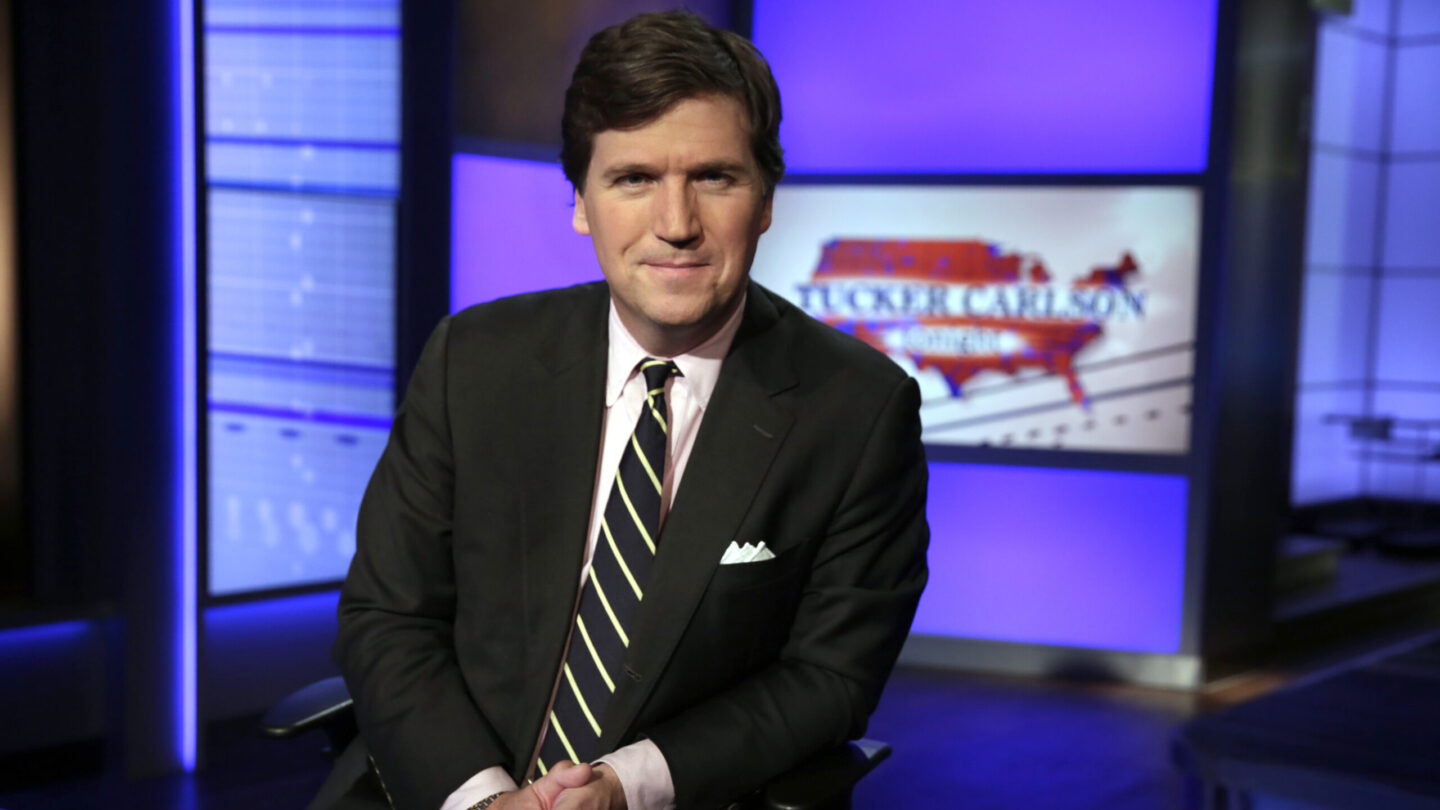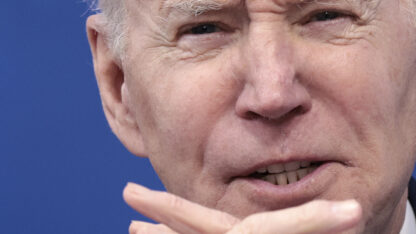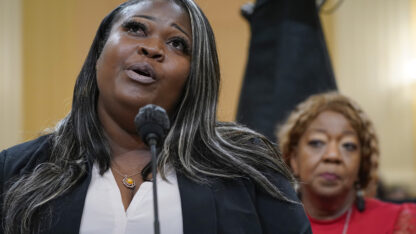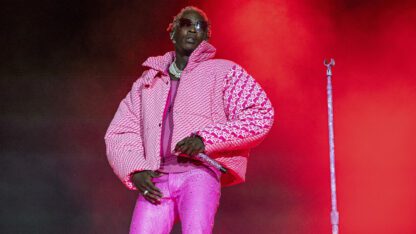It was a lurid and difficult to believe claim: that Ukraine was developing biological weapons with the assistance of the U.S. government. In fact, U.S. assistance to Ukrainian biological labs has been targeted at strengthening public health measures. Both the U.S. and Ukraine have also signed a treaty vowing never to produce or use biological weapons.
But unlike most Russian efforts to spread false narratives justifying its invasion of Ukraine, this one found a receptive audience in the United States among far-right social media channels, Fox News and followers of the QAnon conspiracy theory.
“It’s clearly a case where the U.S. government has been lying; it has mounted a disinformation campaign, if you will, designed to cover up what it is doing,” said Fox News host Tucker Carlson recently. He did not offer specific evidence to back that claim.
The false biolab story spread quickly both in the U.S. and overseas, where Chinese state media joined in the effort to push the narrative.
“The Kremlin is intentionally spreading outright lies that the United States and Ukraine are conducting chemical and biological weapons activities,” U.S. State Department spokesperson Ned Price said earlier this month. He and other officials warn that Russia was working to create pretexts for its attacks on a sovereign nation.
The biolab conspiracy theory is an example of how Russian narratives can be seized on and refined by conspiracy theorists in the U.S., who can often spread false narratives far more effectively than Russia’s own efforts.
Russia has made claims of U.S.-funded biolabs for years
“When it comes to the biolabs, this is an old canard,” according to Scott Radnitz, an expert on post-Soviet Russia and an associate professor at the University of Washington in Seattle.
After Russia invaded Ukraine on Feb. 24, he said the biolab narrative grew “from a trickle to a torrent.”
“There’s this narrative that’s been pushed by Russia at least since 2011, about U.S.-funded laboratories that in fact do research on diseases. They’re part of a Defense Department program to support public health research in post-Soviet countries. And Russia has always been suspicious of these labs — putting out misinformation, asking insinuating questions through official channels,” said Radnitz.
The biolab narrative “exploded on social media right at the time of the invasion, and it looked like it was quickly picked up by the far right on social media and QAnon promoters,” Radnitz said.
One QAnon follower on Twitter gained thousands of retweets with a thread posted on Feb. 24 claiming that Russian airstrike targets included “US installed biolabs” and citing Russian accusations that the U.S. has been developing “bio-weapons” at those facilities. This thread, according to extremism researchers, ended up being a significant inflection point that revived what had been a languishing Russian disinformation narrative.
“I actually consider it to be potentially the most significant failure from a mainstream social media platform to enforce their QAnon crackdown since they started in mid-2020 because the consequences of that have been so significant,” said Alex Kaplan, a senior researcher at Media Matters.
The user, who posted under the handle @WarClandestine until the platform suspended the account, had previously posted extreme content calling for the execution of public officials such as Anthony Fauci.
Russia’s false claims about the biolabs quickly raised concerns that it might be preparing to attack Ukraine with biological weapons, and laying the groundwork to blame Ukraine, the U.S. and possibly NATO for the attacks. But there are other possible explanations for Russia mounting a disinformation campaign.
“It could also be that this narrative is just expedient and serves the purposes of the Russian government,” Radnitz said, “which needs as much pretext as possible to justify what it’s doing in Ukraine — why it’s bombing cities, and why it’s bombing civilian areas.”
False claims of biological warfare have long been a favorite topic for Russian and Soviet propaganda. In the 1980s, the Soviet Union falsely claimed that AIDS was the result of U.S. government biological warfare research.
Once conspiracy theorists and right-wing influencers in the U.S. started running with the false claim of U.S. bioweapons development in Ukraine, Russia dug in. Twice this month, it called for emergency United Nations Security Council meetings to discuss its allegations. At the latest of these, several of the council’s 15 members called the discussions a “charade.”
The theory plays on COVID-19 skepticism
The biolab conspiracy also plays on the obsessions of the far right in the United States. Since the beginning of the COVID-19 pandemic two years ago, conspiracy theorists have embraced a claim that the virus was released from a Chinese biological lab in Wuhan (a recent scientific study reaffirms that the virus likely emerged from a live animal market in the city).
Jared Holt, a resident fellow at the Atlantic Council’s Digital Forensic Research Lab, said the conspiracy also gained steam because it offered multiple onramps for people who may harbor fringe views, even if they may not believe in the QAnon conspiracy theory.
“In this biolab conspiracy theory, if they said, ‘Russia is airstriking biolabs and I know this because Q told me,’ I don’t know if it would have had the same effect,” said Holt. Instead, the disinformation was packaged along with other sentiments that have taken hold of a much larger swath of the far right during the past two years.
“It can be skepticism about the origins of COVID-19, it can be general kind of anti-government distrust,” he said. “And by tapping into these vaguer sentiments, they can sometimes get their messages to go further.”
The current level of political polarization in the United States presents an opportunity for Russian propagandists, said Radnitz. “Russia knows very well that some of its narratives resonate among the far right, among the pro-Trump and QAnon crowd.”
More evidence for that thesis came Thursday when Russia’s Defense Ministry claimed that President Biden’s son, Hunter, and liberal billionaire George Soros were somehow tied to the biolabs. By evening, Carlson’s Fox News show was highlighting the story.
Another key moment for the spread of the false bioweapon narrative came during the testimony of Undersecretary of State for Political Affairs Victoria Nuland before the Senate Foreign Relations Committee earlier this month.
Under questioning by Sen. Marco Rubio, R-Fla., Nuland affirmed that Ukraine has “biological research facilities” and that the U.S. is concerned that Russian forces may seek to gain control of them. Almost immediately afterward, Nuland also stated, “There is no doubt in my mind” that if a biological weapon is used in Ukraine, it would be the work of Russia, not Ukraine or its allies.
But Fox News’ Carlson then cited Nuland’s testimony to air the conspiracy theory on his cable show.
“What she said did not validate what they are claiming,” said Holt. “But for the audiences that are really stuck inside these bubbles of hyperpartisan media, conspiratorial media, scrutiny is not really a strong suit.”
When a narrative takes hold on Fox News and is embraced by Tucker Carlson and Steve Bannon, Radnitz said, “then there’s a symbiosis between Russian foreign policy objectives — pro-state narratives in Russia — and anti-government narratives in the U.S. that these far-right personalities are pushing mostly for profit and notoriety.”
Since the invasion of Ukraine, Russian state media has regularly played clips from Tucker Carlson’s Fox News show to validate the Russian government’s statements and actions. Russian Foreign Minister Sergey Lavrov went out of his way to praise the conservative news network last week after condemning Western media coverage of the invasion.
“We understood long ago that there is no such thing as an independent Western media. In the United States, only Fox News is trying to present some alternative point of view,” he said.
When NPR asked Fox News for comment about Lavrov’s remarks and the network’s repeated airing of the biolab theory, a spokesperson pointed to other comments Carlson has made in recent weeks — including saying Russia’s invasion “was wrong” and saying Putin is “to blame” for events in Ukraine.
Moscow notches a win in the information war
While most of Russia’s efforts to control the narrative about Ukraine have failed, Holt, the disinformation researcher at the Atlantic Council, fears that the biolab conspiracy offers a worrying example of what success looks like.
“What it did do was it gave the Kremlin a taste of a propaganda win in a conflict where it had astonishingly few of them,” Holt said. “The concern would be that this could be kind of a model or a teachable moment for them to be more effective in their propaganda going forward.”
For Radnitz, whose academic work examines why disinformation resonates, the biolabs story brings an old aphorism to mind: A lie flies halfway around the world before the truth gets out of bed.
“We’re chasing this thing, and by the time fact-checkers are aware of it, it’s already gone around the world multiple times, and it’s really too late. The dam is broken,” he said.
While that idea may seem intrinsically linked to the internet age, it’s worth remembering that such notions extend hundreds of years into the past. In 1710, for instance, Jonathan Swift wrote, “Falsehood flies, and the truth comes limping after it.”
Copyright 2022 NPR. To see more, visit https://www.npr.org.
9(MDAxODM0MDY4MDEyMTY4NDA3MzI3YjkzMw004))

9(MDAxODM0MDY4MDEyMTY4NDA3MzI3YjkzMw004))









